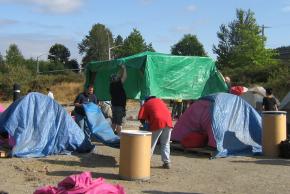Seattle homeless camp evicted
reports on how the city of Seattle marked the one-year anniversary of the Nickelsville tent city.
AS THE economic crisis continues to take its toll, the city of Seattle is ratcheting up the war on its most vulnerable citizens. But the homeless and their supporters are fighting back.
Just days after its one-year "birthday," the homeless encampment Nickelsville was evicted yet again. At midday on September 30, over 80 armed officers of the Valley Civil Dispute Unit (part of the Port of Seattle Police) forcibly evicted residents from Terminal 107 Park.
The port claims that Nickelsville can't legally camp in the park. But Real Change Communications Director Revel Smith pointed out that a homeless facility was allowed to stay at a port terminal in 2003. "Nickelsville has always maintained its own hygiene facilities and rented porta-potties so as not to rely on resources in the park," Smith added. "Twenty-four-hour security is shared by residents, which benefits the park. Quiet hours are maintained for a peaceful night's sleep."
As Michael van Banker wrote at the SunBreak Web site, "Evicting a homeless group is like ending gun violence with a shootout." City officials have offered neither an alternative place for the encampment, nor more permanent housing options for residents.

Despite the fact that they had no other place to go, most residents left peacefully. Police then moved in to seize all remaining property and arrest 12 Nickelodeans who stood their ground, among them an 82-year-old woman. When asked why he was willing to be arrested, one handcuffed resident responded, "Because this is something that I believe in."
As an emergency measure, the St. Andrews Episcopal Church offered Nickelsville residents a place to stay for the next week, but after that the future is unclear.
"By not only denying people a place to live, but by physically forcing them out of a community, the city is conducting an act of violence against the poor," Nick Golden wrote on the Real Change Organizing Project blog.
"There is just not enough space in the city's emergency shelter system to accommodate the number of homeless individuals in Seattle, yet that is where they are being told to go. The city is simply pushing people around, forcing them to go from once temporary location to another, without offering any real solutions."
MEANWHILE, ANOTHER battle is escalating around the city's decision to cut off funds for a local homeless organization. The Seattle Housing and Research Effort (SHARE) is a self-organized homeless organization which operates a network of 15 indoor shelters and two tent cities, providing safe shelter for over 550 people in the area.
For many years, the group received a modest $50,000 annually from the city for bus tickets. On September 22, these funds were cut off, leaving residents with no way to travel to and from shelters. In protest, residents have started camping out on the lawns of city politicians. Their first stop was the lawn of Seattle Mayor Greg Nickels. After that, campers themselves outside Councilman Tim Burgess' house.
As SHARE explained in a statement:
There are some in the over-privileged strata of society who naively see our actions as a theatrical extortion tactic, which shows how disconnected some people are from the harsh realities of life. Too many Americans are one paycheck away from homelessness. Without transportation, we cannot access our safe place to stay at night. We choose instead to sleep out and protest at the houses of those (the politicians) responsible for our predicament.
Unsheltered people die outside. Already this year...29 homeless people died outside or by violence.
So far, the campouts have proceeded without incident, despite a heavy police presence. In a show of solidarity, Metro bus drivers agreed to transport campers free of charge, on the promise of being reimbursed as soon as the city restores funding. SHARE members are meeting with the bus drivers' union in the coming days to discuss more ways to work together.
For his part, Councilman Burgess made a show of coming out and speaking with the campers on the first night and promised to look into the matter.
His inactions, however, speak louder than words. Not content with merely cutting off funds for the homeless, Burgess apparently wants to criminalize them even more. His forthcoming proposal to the City Council would ban panhandling near ATMs and cars, at street intersections and freeway onramps, and anytime after dark. As Tim Harris wrote in an editorial for the Real Change News:
These laws, which identify visible poverty as an indicator of social disorder and seek to eliminate potential sources of urban discomfort, pander to fear and deny the collective responsibility we have to one another. They solve nothing and are a victim-blaming, short-term response to wholesale system failure.
The answers, while not easy, are hardly rocket science. Drug decriminalization and increased support for drug and alcohol treatment. Hedges against gentrification and deeper commitment to affordable housing. Economic stimulus spending to create work for the poor. Universal health care and adequate mental health services. Fair taxation to increase the burden of social responsibility upon the rich.
The rich and powerful have shown their complete disinterest for enacting such obvious measures. It will take the growth of struggles like those developing today to win a more sane and humane alternative.


